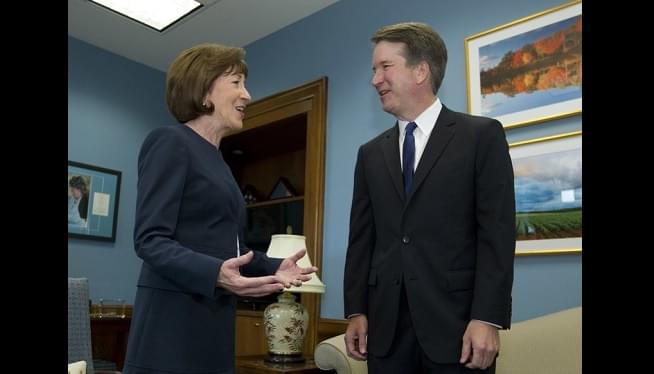WASHINGTON (AP) — Supreme Court nominee Brett Kavanaugh said Tuesday he agrees that the Roe v. Wade decision on abortion rights is settled law, according to Sen. Susan Collins, a Republican from Maine who is a key swing vote on his nomination.
Collins held a two-hour meeting with Kavanaugh in her office that she called “very informative.”
“We talked at great length about precedent and the application of stare decisis to abortion cases,” Collins said, using the legal term for letting precedent stand. “We talked about executive power. We talked about the Heller gun decision. We talked about his judicial philosophy. We talked about which judges he admires most or he feels most similar to.”
Collins also said she pressed Kavanaugh on whether he considers Roe v. Wade to be established law.
“He said that he agreed with what (Chief Justice) John Roberts said at his nomination hearing, in which he said that it was settled law.”
That answer could be crucial for Kavanaugh’s chances of being confirmed. Collins supports abortion rights and has vowed to oppose any nominee who has “demonstrated hostility” to Roe v. Wade.
Republicans have a narrow 50-49 majority in the Senate due to the absence of ailing Sen. John McCain, R-Ariz., and can’t afford a single defection on Kavanaugh if every Democrat votes no.
Collins said she would not make a decision on whether to vote for Kavanaugh until after the Senate Judiciary Committee holds confirmation hearings after Labor Day. Yet she has spoken highly of the judge, praising his qualifications.
The closed-door session with Collins kicked off a busy day for Kavanaugh, an appellate court judge who is making the rounds on Capitol Hill.
One key meeting Tuesday will be with Senate Minority Leader Chuck Schumer of New York, who is leading the Democratic resistance to his nomination.
Schumer downplayed Kavanaugh’s remark about Roe v. Wade, calling it a dodge used by past Supreme Court nominees.
“Of course we know Roe is settled law. We need to know if Judge Kavanaugh believes it was correctly decided,” Schumer said, adding that he will ask the judge that question.
Schumer also said he plans to ask Kavanaugh to fully support releasing documents from the Bush White House that Republicans have declined to review.
“I hope he comes prepared to answer direct questions,” he said.
Democrats complain that Republicans are withholding documents in their rush to confirm Trump’s pick for the court ahead of the midterm elections.
Despite Schumer’s efforts to build opposition, several Democrats from states that Trump won in the 2016 election remain undecided on the nominee.
Sen. Claire McCaskill, D-Mo., was noncommittal after meeting with Kavanaugh on Tuesday. She says she talked to the judge about access to health care and getting “dark money” from anonymous donors out of politics.
Trump won Missouri by nearly 19 percentage points in 2016.
Kavanagh, 53, is a conservative who, in replacing retired Justice Anthony Kennedy, could tip the court rightward for a generation.
Several Democratic women senators joined with advocates for women’s health care Tuesday to talk about the stakes of adding Kavanaugh to the court, particularly when it comes to access to abortion services.
“This is a wakeup call,” said Sen. Kirsten Gillibrand, D-N.Y. “Do not take this moment lightly.”
Sen. Tammy Duckworth, D-Ill., also said Kavanaugh should have no problem releasing all his writings and documents. “Why would he be complicit with this administration in hiding all of this paper that’s out there?” she asked.
Kavanaugh has already met with most Republicans but his meeting with Collins, and a meeting expected later this month with Sen. Lisa Murkowski, R-Alaska, will be crucial. Both senators both support access to abortion services.
Republican Sen. Lamar Alexander of Tennessee scolded his colleagues for treating the nominee as if he’d just been released from prison and said he hoped the discourse around Kavanaugh’s nomination remained civil. “I hope we treat him with dignity and respect,” Alexander said.
Republicans are using an expedited process to review Kavanaugh’s lengthy record in public service, drawing on records assembled by Bush’s lawyer, Bill Burck, separate from those traditionally compiled by the National Archives and Records Administration.
Republicans say there is plenty to review, including 300 court cases from his 12 years as a judge, and are only seeking records from Kavanaugh’s time in the White House counsel’s office. Democrats also want documents from Kavanaugh’s three-year stint as Bush’s staff secretary.
The National Archives is also producing documents from Kavanaugh’s time on Kenneth Starr’s investigation of President Bill Clinton, but has said its larger cache of files from the Bush years won’t fully be delivered until late October.
Documents released Monday from the Starr investigation include a two-page memo in which Kavanaugh suggested that attorneys preparing to question Clinton seek graphic details about the president’s sexual relationship with Monica Lewinsky.
Another memo released earlier this month showed Kavanaugh opposed to indicting a sitting president and in favor of sending the findings of the investigation to the Justice Department for the next administration to review.
Republicans hope to have Kavanaugh confirmed by the start of the court’s session Oct. 1.
Copyright 2018 The Associated Press. All Rights Reserved. This material may not be published, broadcast, rewritten, or redistributed. (Photo: AP)





















